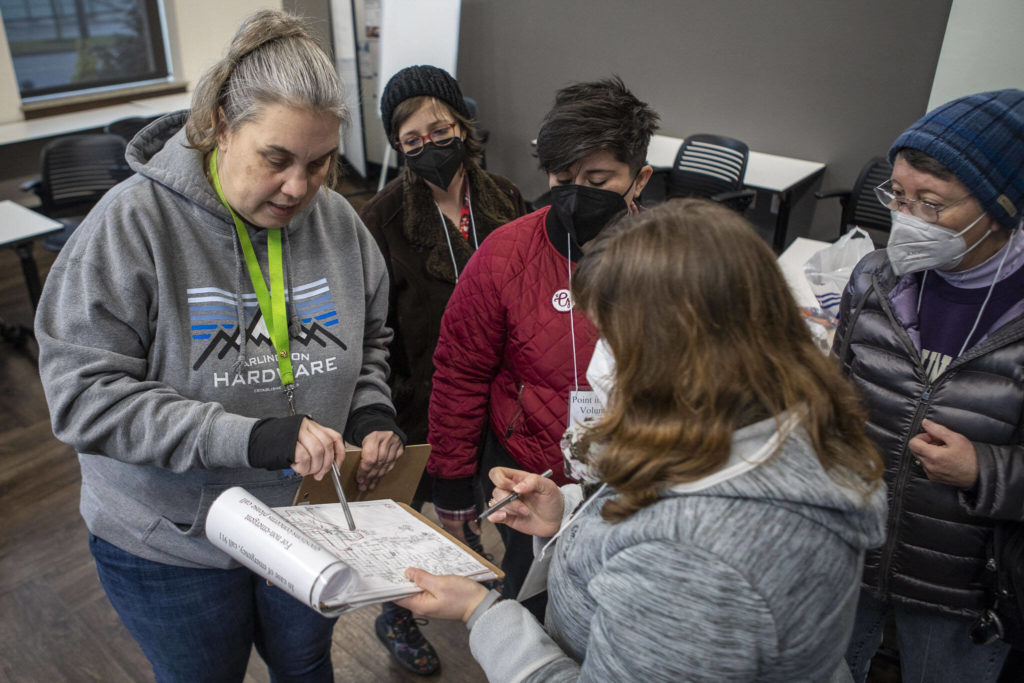EVERETT — He didn’t sleep last night.
Instead, the 33-year-old man wandered the streets of Everett, trying to keep warm and stay awake, he said.
“It’s easier to sleep during the day. It’s safer,” said the man at Broadway and Everett Avenue, who asked not to be named. “And I’m less likely to get charged with trespassing when I sleep during daylight.”
Rain drizzled steadily as he spoke, and cars whizzed past, spitting exhaust. He answered a series of survey questions as part of Snohomish County’s point-in-time count, an annual census of local homelessness.
Volunteers equipped with warming kits, new socks and toothbrushes set out Tuesday to count people living on the street, in transitional housing or in a shelter in central Everett.
Last year, 1,184 people were identified as unhoused in Snohomish County during the PIT count, the highest number since 2012.
The man on Broadway told volunteers he has been without shelter for about a year, but he has been facing homelessness for a long time.
At 12 years old, he started using fentanyl.
“I guess I look like my mom, so my father punished me harsher,” he said. He rebelled at a young age, and in an effort to get out of the house, he started hanging around older kids. He has now been using fentanyl on-and-off for two decades, he said.
If people decline to be surveyed, they are not counted. So the annual count essentially reflects the minimum number of people facing homelessness.
“We just saw five people, but only one agreed to be surveyed,” said Rita Jo Case, the regional director of housing services at Catholic Community Services. “That’s only 20%.”
Case walked down Everett Avenue through the rain, clipboard in hand. She rounded a chain link fence and stepped through the mud to introduce herself to Mel Jennings, 62. He crouched under a makeshift cardboard tent.
Jennings had brain and spinal surgery, and he has now been without shelter for more than a year. After being cut off from disability payments, he was forced out of his apartment, Jennings said. He receives Social Security income, but it isn’t enough for housing, he said.
Case said the count is vital information not only for federal funding, but to paint a picture of the community.
The 2021 PIT count was canceled due to the pandemic, but typically, organizations that receive federal funding to fight homelessness are required to conduct the counts. PIT counts will be happening in different cities all around Snohomish County within a designated two-week period.
Washington’s eviction moratorium — the ban on evicting people during COVID — ended on June 30, 2021. Since then, rent prices have been on the rise.
For about 11 hours, volunteers gathered information from people who would talk. Every few hours, groups of three to five set out to cover various areas of the city.
Under an overpass, Case’s group bumped into Leroy, a man in his 50s who asked that his last name not be published.
“The people up there,” said Leroy, pointing up toward the cars rumbling across the bridge, “they don’t know we’re soldiers down here. We have to find out how to eat — where to lay our heads — every day.”
“Out of the five of you,” he said, gesturing to the group of volunteers, “I’d say three of you don’t make it out here. And everyone is one missed paycheck away from being here.”
This year’s PIT count report is expected to be published this summer.
Kayla J. Dunn: 425-339-3449; kayla.dunn@heraldnet.com; Twitter: @KaylaJ_Dunn.
Talk to us
> Give us your news tips.
> Send us a letter to the editor.
> More Herald contact information.































